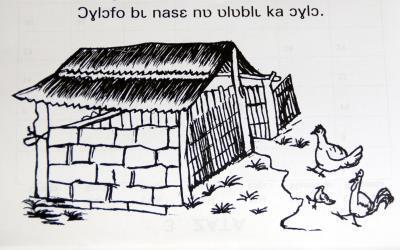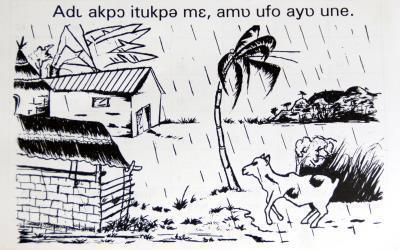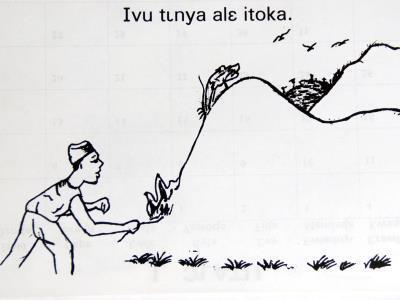Ivegbe bɩ nadʋ unyi afʋkpa.
Français : La biche ne peut jamais porter les sandales d'éléphant.
Anglais : A doe can never put on the shoes of an elephant.
Aɣla kpa bɩ nawʋ ɔɣɔ.
Français : Les mains vides ne tuent pas le serpent .
Anglais : You cannot kill a snake with empty hands.
Akʋ edini bʋa bɩ kʋ inye.
Français : On balaie la chambre avant de balailler le dehors.
Anglais : First sweep the room and then the compound.
Ʋtʋ bɩ naba ba ɛlʋ.
Français : Les oreilles ne dépassent jamais la tête.
Anglais : Ears are not higher than the head.
Ɔlʋ yɛ ama ʋkɔ ta akɔnavlɛ ala la.
Français : Une femme qui a des jumeaux se couche sur son dos.
Anglais : A woman with twins lies on her back.
Ananazɔ ɔlʋ edigbo bɩ nʋ awʋadɩ.
Français : Une seule personne ne forme pas le peuple.
Anglais : A single person is not a people.
Mʋ alʋkʋ atsɩlili ka yɛ mʋanɩ mʋanɩ o, mɛ yamɔ utǝ ta.
Français : Quelque soit l'odeur de la bouche on ne refuse pas d'avaler sa salive.
Anglais : What ever the smell of the mouth one cannot refuse to swallow one's saliva.
Unyǝbɩ bɩ nata aga.
Français : Quelques soient les plaintes du pauvre, il demeure toujours pauvre.
Anglais : Whatever the complaints of a poor, he remains poor.
Adɩ akpɔ itukpǝ mɛ, eyi ufo ayʋ une.
Français : C'est la pluie qui montre à la chèvre son domicile.
Anglais : It is the falling rain that shows to a goat the way to his house.


